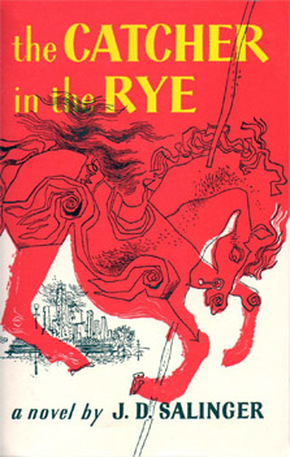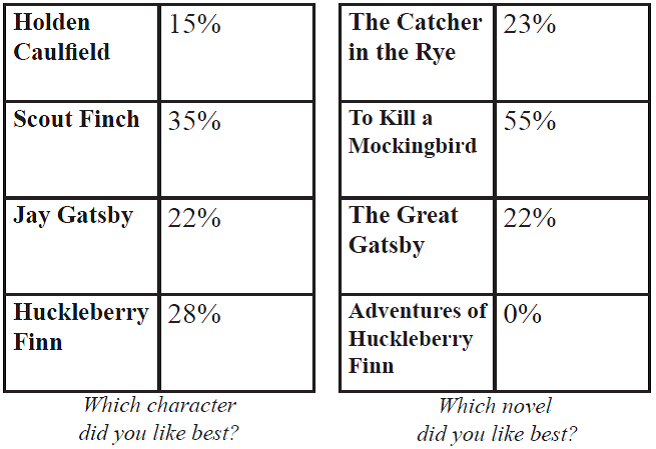 By Samantha Gougher Editor If you’ve ever taken a sophomore- year English class at Council Rock North, you’ve probably become acquainted with the famous fictional character Holden Caulfield. Regardless of your feelings towards the teenage narrator of J.D. Salinger’s The Catcher in the Rye, you’ve probably discussed his antics inside and outside of the classroom. As teenagers, we tend to either admire or despise Holden’s colorful dialogue and cringe- worthy narrative, and we’re surprisingly vocal about our perspectives. When I reflect on my sophomore year, I remember the conversation about Catcher being more active than with any other novel, and I even recall its content inspiring jokes and discussion outside of class. Holden, in a positive or a negative sense, elicited thought; he made us reflect on ourselves, our lives, and the experience of adolescence itself. In the same way that we perceive characters from popular franchises such as Star Wars and The Hunger Games, students always seem to have opinions about assigned English readings. Whether a class hates a book with a scarily unified passion (The Once and Future King) or adores it in a fond, understated manner (To Kill a Mockingbird), it’s amazing to see people forming thought beyond what’s on a 10- question comprehension quiz. It’s a common experience that we all share, whether we like it or not. Because this phenomenon interests me to a pretty dorky extent, I took a survey of students to find out how they feel about the more popular pieces assigned throughout their high school years. Unfortunately, I had to leave out Ethan Frome and Frankenstein since not all classes read them. The selected books span freshman to junior year, so if you haven’t been assigned them yet, this survey will either energize you or completely deflate your spirits. Sorry about the latter. Given a selection of four popular characters, 15 percent of students favored Holden Caulfield (myself included), 35 percent favored Scout Finch, 22 percent favored Jay Gatsby, and 28 percent favored Huckleberry Finn. Given a similar pool of four novels, 23 percent of students preferred The Catcher in the Rye (hello again!), 55 percent preferred To Kill a Mockingbird, 22 percent preferred The Great Gatsby, and zero percent preferred The Adventures of Huckleberry Finn. Clearly there’s a pattern, and we can draw some conclusions from the data. The love for To Kill a Mockingbird is shared by most (as it should be), while novels such as Catcher and Huck are a little more controversial. These reactions can be motivated by gut feeling, admiration or hatred for the characters, or memories associated with reading the books themselves. Although we definitely adored many of the assigned texts, there were a few novels and characters students tend to vehemently dislike. Some even overlap with the selections above, showing how differently things can be perceived by separate people. From another selection of four characters, 37 percent of students least liked Holden Caulfield, 13 percent least liked Tom Buchanan, 37 percent least liked Tom Sawyer, and 13 percent least liked Romeo Montague. Holden, as always, is an object of controversy; some love him, but some think he’s the absolute worst. I’m a Holden apologist and supporter, but I’ll admit that he’s not the most likable or charismatic person. I used to hate him too, until re- reading Catcher nearly a year later. I tried to determine which novels people least enjoyed, but the results were very scattered. Some people really disliked Cry, the Beloved Country, which according to junior Mary- Kate Durnan was “just too sad.” Some singled out Romeo and Juliet or The Merchant of Venice, due to the complexity of Shakespearean language. Some cited The Once and Future King based solely on its obnoxious length. And some, despite my efforts to dissuade them, really did not like The Catcher in the Rye. What a bunch of phonies, am I right? Despite our feelings about specific characters and novels, the students of Council Rock North bond over the assignments we’re given in English class. Whether we’re debating in a fishbowl, writing essays, complaining on the internet, or making jokes at characters’ expenses, we’re experiencing the magic of storytelling and fiction together. The resulting thought in each individual is just as valuable as the grade he or she receives.
0 Comments
Your comment will be posted after it is approved.
Leave a Reply. |
Archives
February 2022
Categories |

 RSS Feed
RSS Feed
